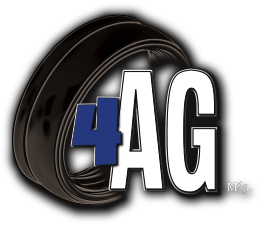How to Choose the Best Gauge Wheel Tire for Planters
Choosing the best gauge wheel tire is crucial for achieving efficient planting and optimal crop growth. As a key component of the planter, gauge wheel tires control planting depth and ensure even seed placement, which directly impacts crop yields. This guide will help you select the right tire for your planter by covering the essential features to look for and the role these tires play in modern farming.
What Is a Gauge Wheel Tire?
A gauge wheel tire is attached to a planter and regulates the depth at which seeds are placed in the soil. It ensures that seeds are planted uniformly, promoting consistent crop stands and better yields. Without the right tire, planters can struggle to maintain proper depth, leading to uneven seed germination and poor crop development.
The best gauge wheel tire should be durable, resistant to soil buildup, and designed for efficient operation in various soil conditions. This ensures that the planter functions optimally across different terrains and weather conditions, resulting in more reliable planting outcomes.
Key Features of the Best Gauge Wheel Tire
Selecting the best gauge wheel tire involves evaluating several factors. Here are the most important features to consider:
Durability: Gauge wheel tires must withstand harsh field conditions. Tires made from high-quality rubber or polyurethane materials are popular due to their resistance to wear, tear, and punctures.
Soil Compatibility: Different soils require different types of tires. For wet or sticky soil, choose a tire that minimizes soil buildup. In contrast, sandy or loose soil may require wider tires to ensure better weight distribution and avoid excessive soil disturbance.
Tread Design: The tread pattern impacts how well the tire interacts with the soil. Wider tires with minimal tread can help in soft soil, while more aggressive treads may be needed in rough or rocky terrain.
Low Maintenance: Tires that are easy to maintain save time and effort. Look for tires designed with self-cleaning features to reduce mud and debris buildup.
Why the Right Tire Matters
Precision farming requires equipment that performs consistently across all field conditions. The best gauge wheel tire plays a key role by helping maintain accurate depth control, leading to uniform seed placement. Precision in planting ensures that crops emerge evenly and grow at the same rate, which is essential for optimal yields.
High-quality gauge wheel tires also reduce the risk of soil compaction around the seed trench, which can limit root development and impact overall plant health. By using the right tire, farmers can ensure that their crops get the best possible start.
Common Challenges and Solutions
Even with the best gauge wheel tire, farmers may face challenges in the field. Here are common issues and tips on how to address them:
Soil Buildup: In sticky or wet soil, tires can accumulate mud, affecting their performance. Opt for self-cleaning tires that shed debris and reduce the risk of buildup.
Wear and Tear: Rocky or abrasive soils can cause premature wear. Regular tire inspections and timely replacements ensure consistent planter performance and maintain proper seed depth.
Inappropriate Tread: Using the wrong tread for your soil type can lead to poor performance. If the tread is too aggressive for your soil, it may disrupt the seedbed, while a too-flat tire could struggle in compacted soils. Make sure to choose a tire that suits your specific soil conditions.
How to Make the Best Choice
Selecting the best gauge wheel tire for your planter depends on your farm's specific needs. If you work with heavy, clay-based soils, you may need a tire that is designed to resist clogging and perform well in sticky conditions. For drier or sandy soils, a wider tire that prevents soil disruption may be a better choice.
Always invest in durable tires that can withstand the wear and tear of different terrains. High-quality tires may require a larger initial investment, but they typically last longer and reduce the need for frequent replacements, saving money in the long run.
Conclusion
The best gauge wheel tire is essential for ensuring proper planting depth and consistent seed placement, both of which directly impact crop yields. By considering factors like durability, soil compatibility, and tread design, farmers can select the right tire to meet their planting needs. With the proper gauge wheel tire, you’ll be well on your way to achieving better crop performance.
For more information on the best tires and other farming equipment, visit our Products Page to explore high-quality solutions for your farm.

